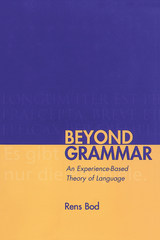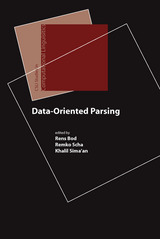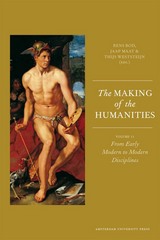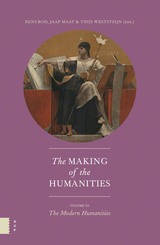4 books about Bod, Rens

Beyond Grammar
An Experience-Based Theory of Language
Rens Bod
CSLI, 1998
During the last few years, a new approach to language processing has started to emerge, which has become known under the name of "Data Oriented Parsing" or "DOP". This approach embodies the assumption that human language comprehension and production works with representations of concrete past language experiences, rather than with abstract grammatical rules. The models that instantiate this approach therefore maintain corpora of linguistic representations of previously occurring utterances. New utterance-representations are constructed by freely combining partial structures from the corpus. A probability model is used to choose from the collection of different structures of different sizes those that make up the most appropriate representation of an utterance.
In this book, DOP models for several kinds of linguistic representations are developed, ranging from tree representations, compositional semantic representations, attribute-value representations, and dialogue representations. These models are studied from a formal, linguistic and computational perspective and are tested with available language corpora. The main outcome of these tests suggests that the productive units of natural language cannot be defined in terms of a minimal set of rules (or constraints or principles), as is usually attempted in linguistic theory, but need to be defined in terms of a large, redundant set of previously experienced structures with virtually no restriction on their size and complexity. I will argue that this outcome has important consequences for linguistic theory, leading to a new notion of language competence. In particular, it means that the knowledge of a speaker/hearer cannot be understood as a grammar, but as a statistical ensemble of language experiences that changes slightly every time a new utterance is processed.
[more]

Data-Oriented Parsing
Edited by Rens Bod, Remko Scha, and Khalil Sima'an
CSLI, 2003
Data-Oriented Parsing (DOP) is one of the leading paradigms in Statistical Natural Language Processing. In this volume, a collection of computational linguists offer a state-of-the-art overview of DOP, suitable for students and researchers in natural language processing and speech recognition as well as for computational linguistics.
This handbook begins with the theoretical background of DOP and introduces the algorithms used in DOP as well as in other probabilistic grammar models. After surveying extensions to the basic DOP model, the volume concludes with close study of the applications that use DOP as a backbone: speech understanding, machine translation, and language learning.
This handbook begins with the theoretical background of DOP and introduces the algorithms used in DOP as well as in other probabilistic grammar models. After surveying extensions to the basic DOP model, the volume concludes with close study of the applications that use DOP as a backbone: speech understanding, machine translation, and language learning.
[more]

The Making of the Humanities
Volume II: From Early Modern to Modern Disciplines
Edited by Rens Bod, Jaap Maat, and Thijs Weststeijn
Amsterdam University Press, 2013
While it is clear that around 1800 the humanities as a discipline rose to prominence, it is less clear what the exact nature of this shift in academia was. Was it a sudden revolution caused by a momentary but powerful change in the zeitgeist or the turning point of a much longer process? In this volume, the editors have selected a series of essays that look at the origins of the humanities and find that long before 1800 the concept of the humanities was already at the fore. The shift around 1800 was thus mostly institutional, not theoretical. The Making of the Humanities traces this new finding through a broad range of disciplines including literary theory, linguistics, art history, and musicology.
[more]

The Making of the Humanities, Volume III
The Modern Humanities
Edited by Rens Bod, Jaap Maat, and Thijs Weststeijn
Amsterdam University Press, 2014
This comprehensive history of the humanities focuses on the modern period (1850-2000). The contributors, including Floris Cohen, Lorraine Daston and Ingrid Rowland, survey the rise of the humanities in interaction with the natural and social sciences, offering new perspectives on the interaction between disciplines in Europe and Asia and new insights generated by digital humanities.
[more]
READERS
Browse our collection.
PUBLISHERS
See BiblioVault's publisher services.
STUDENT SERVICES
Files for college accessibility offices.
UChicago Accessibility Resources
home | accessibility | search | about | contact us
BiblioVault ® 2001 - 2024
The University of Chicago Press









